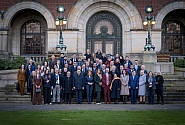
“We must learn from history and face aggression with decisiveness and strength, and, as a democratic organisation, we must use every opportunity to hold Russia fully accountable for its crimes of aggression against Ukraine,” said Zanda Kalniņa-Lukaševica, Deputy Speaker of the Saeima, Head of the Latvian delegation, at a meeting of the Standing Committee of the Parliamentary Assembly of the Council of Europe held in The Hague, the Netherlands.
Z.Kalniņa-Lukaševica underlined Latvia’s support for the creation of an ad hoc international tribunal, which together with the existing international mechanisms would bring Russia to justice. “We want to see those responsible for the Russian war of aggression against Ukraine here in The Hague. The Russian leaders must be tried in a specially created international tribunal. It is also necessary to agree on the establishment of a register in order to record the damage and offences caused by Russia and to ensure reparations for Ukraine on the basis thereof," said the Head of the Latvian delegation.
The Russian aggression war in Ukraine is the biggest threat to the law-based international order and the basic principles of the Council of Europe. We must protect and strengthen our common democratic values and principles. We need to ensure freedom of expression and media, the safety of journalists, including in the digital environment. Information has become a part of warfare, therefore our societies need to develop media and information literacy, as well as resilience to disinformation, said the Head of the Latvian delegation.
In preparation for the Fourth Summit of the Heads of State and Government of the Council of Europe to be held in the capital of Iceland Reykjavik on 16 and 17 May, Z.Kalniņa-Lukaševica expressed the need for the Council of Europe to become more effective, responsive and resilient to external challenges. The Head of the Latvian delegation urged the organisation to further modernise and improve its accessibility, involving civil society and youth in discussions on political processes.
On 2 and 3 March in The Hague, the Netherlands, a meeting of the Standing Committee of the Parliamentary Assembly of the Council of Europe took place, opened by the President of the Assembly Tiny Kox, and with opening remarks by the President of the Netherlands Senate Jan Anthonie Bruijn and the Vice-President of the House of Representatives Tom van der Lee.
During the two days informal consultations of the Heads of Delegation of the Baltic States and Ukraine took place in the so-called Baltic+ group format on the way forward during the April session of the Parliamentary Assembly of the Council of Europe in Strasbourg, as well as an exchange of views on the establishment of an ad hoc international tribunal to prosecute the Russian Federation for the crimes of aggression against Ukraine.
After the meeting, the Deputy Speaker of the Saeima met with the Ambassador of Latvia to the Netherlands, Aiga Liepiņa.
The Council of Europe has 46 Member States and six observers. The Parliamentary Assembly is one of its largest and most visible institutions. Its activities focus on preserving the core values and standards of the Council of Europe, and its main objective is to strengthen the parliaments of the Member States of the Assembly, to promote and protect human rights, the rule of law and democratic governance in all European countries. The Parliamentary Assembly also approves judges of the European Court of Human Rights and other key officials of the Council of Europe institutions. From May to November, Latvia will hold the Presidency of the Committee of Ministers of the Council of Europe.
Saeima Press Service







